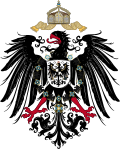
Moonrise by the Sea, 1822, 55x71 cm
German Romanticism (German: Deutsche Romantik) was the dominant intellectual movement of German-speaking countries in the late 18th and early 19th centuries, influencing philosophy, aesthetics, literature, and criticism. Compared to English Romanticism, the German variety developed relatively early, and, in the opening years, coincided with Weimar Classicism (1772–1805).
Contents
- Literary figures
- Philosophical figures
- Composers
- Visual artists
- Architecture
- See also
- References
- Further reading
The early period, roughly 1797 to 1802, is referred to as Frühromantik or Jena Romanticism. [1] The philosophers and writers central to the movement were Wilhelm Heinrich Wackenroder (1773–1798), Friedrich Wilhelm Joseph Schelling (1775–1854), Friedrich Schleiermacher (1768–1834), Karl Wilhelm Friedrich Schlegel (1772–1829), August Wilhelm Schlegel (1767–1845), Ludwig Tieck (1773–1853), and Friedrich von Hardenberg (Novalis) (1772–1801). [2]
The early German Romantics strove to create a new synthesis of art, philosophy, and science, by viewing the Middle Ages as a simpler period of integrated culture; however, the German Romantics became aware of the tenuousness of the cultural unity they sought. [3] Late-stage German Romanticism emphasized the tension between the daily world and the irrational and supernatural projections of creative genius. In particular, the critic Heinrich Heine criticized the tendency of the early German Romantics to look to the medieval Holy Roman Empire for a model of unity in the arts, religion, and society. [3]
A major product of the invasion and military occupation, beginning under the First French Republic and continuing under Napoleon, of the traditionally politically and religiously balkanized Germanosphere was the development of Pan-Germanism and romantic nationalism, which eventually created the German Confederation of 1815 and the German Empire of 1871. German Romanticism was accordingly rooted in both the quest, epitomized by Baron Joseph von Laßberg, Johann Martin Lappenberg, and the Brothers Grimm, for decolonisation, a distinctly German culture, and national identity, and hostility to certain ideas of The Enlightenment, the French Revolution, the Reign of Terror, and the First French Empire. Several major Romantic thinkers, especially Ernst Moritz Arndt, Johann Gottlieb Fichte, Heinrich von Kleist, and Friedrich Schleiermacher, embraced many elements of Counter-Enlightenment political philosophy and were hostile to Classical liberalism, rationalism, neoclassicism, and cosmopolitanism, [4] Other Romantics, like Heine, were fully in support of the German Revolutions of 1848.








